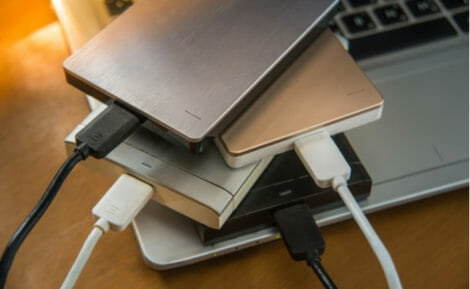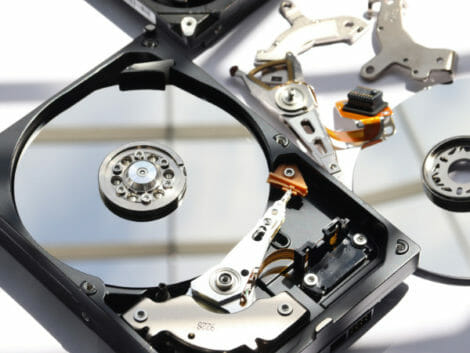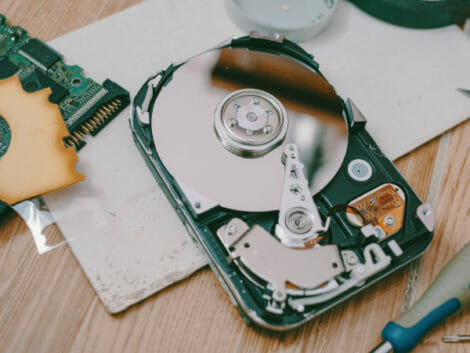How to Choose Your Disk Space
There’s a general belief that bigger is always better when it comes to space, but is it? People say you can never have too much space, but when looking at hard disks, there’s a very good chance that you don’t need massive space. Let’s get into it.
What is Disk Space?
The maximum amount of data a disk can hold is the disk space, disk storage, or storage capacity. Whenever you save any information (music, movies, files) to a disk, that information takes up space in that disk.
How is Hard Drive Capacity Calculated?
Space is calculated and displayed in bytes, but mostly in megabytes, gigabytes, and sometimes terabytes. There are certainly much larger sizes, like petabytes, but those are way too large for the average person to use.
These megabytes and other sizes often come in media that can hold information. Your phone, CD, USB stick, and SD card are all examples of devices capable of storing information, and they each have differing sizes.
When you fill up the storage space on a disk, like putting 4 gigabytes of movies on your 4 gigabytes SD card, you can’t store any more movies or other data in the memory. The total capacity has been reached. The storage capacity has been filled, and you would have to delete some data before storing new data and accessing data on the memory.
How Much Storage Capacity Do You Need?
The answer to this question mainly lies in what you need storage. If you’re looking to install an operating system like Windows on your laptop, you would need a minimum of 20 gigabytes (GB) to 60GB of free space, just for the installation.
Microsoft Office would require about 3GB of free space, and if you’re looking to get into picture manipulation, Adobe Photoshop would another 3GB as well. Games, CAD programs, audio editing programs, and other tools would need from 4GB to as much as 100GB of free space, especially for very large games.
So, essentially, if you’re going to need an operating system like Windows on your laptop, alongside Microsoft Office for work and a few games, you could be looking at about 300GB required.
How Much Storage Space Should You Get?
People have many storage options with technology, including cloud storage services and external storage spaces like SD cards. If you’re looking to set up a new computer, but you save most of your media externally, you could make do with a smaller-sized hard drive to save cost. Your new drive might just serve as backup to prevent data loss, so it doesn’t need to have a large storage capacity.
120GB to 250GB would be great for work or school-related purposes, and other entertainment-related data can be saved on external hard drive/storage.
However, if you can bear the cost and prefer to save all your data on a single hard drive, you can get a large hard drive (1TB to 2TB) instead of getting two drives with different storage capacities. In most cases, a 512GB hard disk would suffice for most people, except gamers.
How Much Space Do Documents and Media Files Take in a Hard Disk Storage?
The question of “how much content” or “how much space” is very vital, especially if you’re trying to get a new computer. It’s usually hard to give an exact figure to the sizes required for documents in binary data, as well as media files.
They all vary, depending on the length, format, and what might be inside the file itself. Photo sizes will differ from video sizes, which will differ from movie sizes, which will also differ from audio sizes.
Here’s a generally helpful guide regarding how much data you’d expect to store on a 2GB disk storage:
- 1 hour MPEG-2 video
- 65 typical Semi-Pro Camera RAW images
- 400 3000 x 2000px JPG files
- 200-500 typical PDF files
- 5000 3-4 minute mp3 Songs
- 1000 to 200,000 typical Excel files
- 8000 to 200,000 typical Word files (without images)
Does Speed Matter With Hard Disk Drives?
There are two major types of drives: hard disk drives (HDD) and solid-state drives (SSD). Both are inherently similar in that they usually have massive disk storage capacity in GB or terabytes (TB).
However, where they differ is in speed. A hard disk drive (HDD) is powered by rotating disks that spin at a particular speed, irrespective of how much storage the hard drive contains.
The faster the hard disk drive spins, the more information it can read and write data from the disk. Laptop hard drives often run slower than desktop hard disk drives, as the desktops can reach 15,000 revolutions per minute (RPM) while a laptop computer can only spin at about half of that. If you use your computer for gaming or heavy-duty work, consider getting a hard drive with fast-spinning disks to ensure high performance.
A slower hard drive or small space is not reliable and will certainly make your computer lag with games and work and could slow you down.
Due to advancements in technology, today’s computer hard drives are SSD, which doesn’t have a motor that runs in revolutions per minute.
The SSD has no moving parts. Speed is measured in megabytes (MB) per second. In the same way, RPM doesn’t affect a hard drive’s storage capacity, MB/s doesn’t affect storage capacity in SSD. With SDD, you can get small space with very high speeds, or even large capacity with lower speeds, depending on your preferences.
So How Much Disk Storage Do You Need?
As long as you set aside the base 80GB, you need to install large operating systems like Windows and other system programs. You also need to free space on your hard drive for programs you will be working with.
If you’re into film creation or architectural designs, you could need an extra 10 to 50GB for software. If you’re studying for school, maybe just 5 to 10GB, and if you’re a gamer, 500GB might suffice.
Then, would you use your device to store a lot of multimedia? If you’ll be storing and watching movies on your device, and each movie is approximately 2GB, then you’ll need at least 300GB on your hard drive for about 150 movies. If you intend to save a lot of photos and music to your PC as well, then you might need to set aside another 5GB for that.
Keep in mind that it is important to over-plan. If you need 120Gb, getting something substantially higher, like a 250GB hard drive, would be beneficial, and there’s a reason for this. All hard drives work better when there is ample space on them. Any time your hard drive capacity is more than 80% used space, it will slow down noticeably.
Physical size constraints
Desktops usually have larger storage capacity than laptops, which usually have larger storage capacity than phones. Because desktop computers are big, it is possible to physically fit in a larger disk and even store several users’ data easily.
Laptops are smaller than desktops, and the biggest disk capacity you will usually find for a (very big) laptop is 1TB. Physical space is smaller with laptops, so hard drives are also smaller.
Because phones are much smaller, you’d be hard-pressed to find phones with more than 500GB of storage in-built. So, depending on your device, storage can differ.
Related Articles
Conclusion
Choosing the perfect storage space for your device means you need to decide what you’ll be saving on that space. If you need a massive amount of space and a lot of speed, using a desktop would be more beneficial and suit your storage needs.
Laptops are more portable, but they can offer constraints around storage capacity. However, most people don’t need more than 1TB of total capacity, making these portable devices very beneficial and popular. Phones are similar, with people saving mostly videos and other multimedia, and because phones often offer external storage slots, it’s easy to make do.
External storage can include everything from cloud storage to your USB stick, as long as it can store information outside a device. You might find that you can put bulky content on external storage spaces and leave your hard drive space to hold only your most important data.



